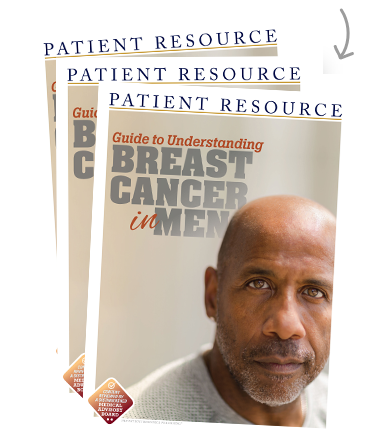Male Breast Cancer
Second Opinion
As you navigate this new territory, you may wonder if your doctor’s treatment recommendations are the best for you, and you may consider seeking an opinion from another doctor. Or, you may be hesitant about getting a second opinion and wonder if it is even worth it. Think of it this way: People get second opinions all the time about which car to buy and who should perform maintenance on their house. Why would you not get a second opinion about something as valuable as your health?
Getting a second opinion is encouraged for a number of reasons. Gathering as much information as you can before starting treatment may help you feel more confident in making the decisions ahead. And it is a great step in becoming an advocate for your own health care.
Another doctor’s opinion may change the diagnosis or reveal a treatment your first doctor was not aware of. A second opinion is also a way to make sure your pathology diagnosis and staging are accurate, and that you are aware of clinical trials that you might want to consider. You need to hear information about all of your treatment options. There is often collective wisdom gained from the experience and opinions of different oncology specialists who are experts in your type of cancer.
Second opinions are encouraged if you live in a small town or rural area where there may not be as many oncology specialists, especially if you might need a highly specialized or complicated type of care. If so, you may want to get an opinion from specialists at a larger medical center or comprehensive cancer center with particular expertise in treating breast cancer in men. In addition, it will provide an opportunity to decide if a different doctor, health care team or treatment center is a better fit for you.
Where do you start?
The process involves locating another cancer specialist or group of specialists to review your medical records and confirm your doctor’s diagnosis and treatment plan. Finding these experts is not always easy, and you may worry that you will offend your doctor or hurt your doctor’s feelings if you seek the advice of another expert. Do not let that stop you. Most doctors welcome a second opinion and may even recommend another physician or hospital. Start by asking your own doctor. Above all, the goal is for you to have the best care available.
Following are some places to look for a second opinion:
- The nearest hospital, medical clinic or cancer center.
- Other professional cancer organizations and patient advocacy groups.
- A major regional cancer center or research-oriented hospital.
- Another qualified pathologist, especially if there is difficulty or controversy in the pathology interpretation. Be sure to get a pathologist’s second opinion if the initial pathology report does not contain a definite diagnosis, if you have a very rare cancer or if you have a cancer that has metastasized.
- Another cancer specialist who may be an authority in specific treatments for specific cancers, such as a surgeon who operates on complicated tumors or a medical oncologist with an experimental treatment that has been shown to be successful in preliminary studies but is still not widely offered.
Preparing for an appointment
Before you meet with another medical professional for a second opinion, make sure you have all of your medical records related to your cancer. This may include laboratory, biopsy or imaging test results as well as any other tests or procedures you have had. It may be helpful to call the doctor’s office to find out if any information needs to be sent ahead of the appointment.
Some doctors may prefer to do their own testing before the appointment. Find out whether that is required and when to get the tests so the results will be ready in time for your in-person visit.
Make the most of your consultation by doing the following:
- Take notes. You may hear new information that your first doctor did not mention.
- Bring a friend or family member. Ask in advance if you can have another person at the in-person appointment. This person can also help take notes and listen, which can be valuable because they may hear information you do not. Some centers have limitations due to COVID-19. If that person cannot be in the room with you, consider calling and putting the phone on speakerphone.
- Ask questions. It may be helpful to bring a list of questions with you to the appointment. Always ask the doctor to explain anything you do not understand. Consider asking the doctor to provide pamphlets or booklets about the information being shared at your appointment that you can take home and review.



